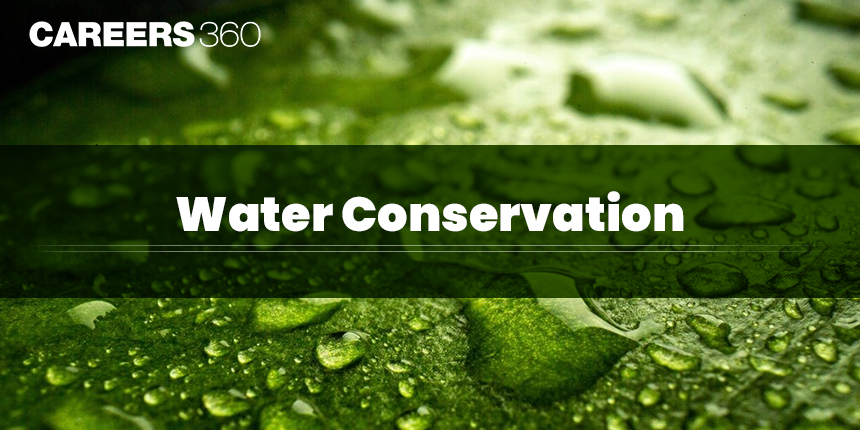Water Conservation Essay - Essay on Water Conservation in English
Water, the essential component for life on our planet, is often undervalued. We have become accustomed to simply turning on a tap and expecting it to provide us with an endless supply of freshwater. However, this convenience has caused us to overlook the intricate process that water undergoes before it reaches our homes. As we face the threats of climate change and rapidly growing populations, it is becoming clear that freshwater is a limited resource that we are depleting at an alarming rate.
This Story also Contains
- 100 Words Essay on Conservation of Water
- Short Essay of 200 Words on Water Conservation
- 350 Word Essay on Water Conservation

100 Words Essay on Conservation of Water
Water conservation is important for a sustainable future. Every drop saved contributes to preserving this precious resource. Simple habits, such as turning off taps while not in use, fixing leaks promptly, and collecting rainwater, make a significant impact.
Education and awareness among communities, especially children, play a crucial role. Through small actions and spreading the message, we can ensure the availability of clean water for essential needs while reducing our environmental footprint. Water conservation is a responsibility we all share to safeguard our planet and secure a better future for generations to come.
Short Essay of 200 Words on Water Conservation
Water conservation is a crucial practice that every school child should understand and embrace. Water is a finite resource essential for life, and its conservation plays a pivotal role in ensuring a sustainable future. Everyone can contribute to water conservation through simple yet impactful actions.
Firstly, turning off taps when not in use is a fundamental practice. Whether washing hands or brushing teeth, being mindful of water usage can save significant amounts over time. Additionally, fixing leaks promptly is essential to prevent wastage. Children can also participate in collecting rainwater for non-drinking purposes, such as watering plants or cleaning.
Furthermore, raising awareness about water conservation among peers and family members is vital. Schools can organize educational programs, projects, or campaigns to emphasize the importance of water conservation. Children can actively engage in discussions, presentations, or art projects to highlight the significance of preserving water resources.
In conclusion, water conservation is a responsibility that everyone should shoulder whether he is a child or an adult. By adopting water-saving habits and promoting awareness, people can contribute to a sustainable and water-secure future for themselves and generations to come. It is through their collective efforts that we can ensure the availability of clean water for essential needs while respecting the environment.
350 Word Essay on Water Conservation
Crystal clear, life-giving, essential – water is the life of our planet. Yet, despite covering 71% of Earth's surface, only 2.5% is freshwater is available for human consumption. As populations increase and climate change intensifies, securing this precious resource becomes ever more critical.
The harsh truth of water scarcity is that more than 2 billion individuals worldwide do not have access to clean drinking water. If current trends continue, by the year 2025, two-thirds of the global population could experience water scarcity. The effects of climate change are significantly impacting precipitation patterns, resulting in more frequent occurrences of droughts and floods. Furthermore, pollution continues to render vast quantities of water unfit for consumption.
The contamination of water sources, unequal distribution, and unsustainable practices create a situation where millions are left without access to clean drinking water and are made vulnerable. The consequences of this crisis are dire and encompass stunted economies, strained ecosystems, and conflicts arising from the resources.
Failing to take action can have severe repercussions, as lack of access to water can lead to conflicts, displacement of communities, and economic decline. Additionally, it poses a threat to food security by reducing agricultural yields and endangering food production. Poor sanitation and hygiene in areas lacking water can also increase the prevalence of waterborne diseases, putting millions at risk.
Amidst the crisis, a glimmer of hope arises. Every drop of water saved is a victory, sending forth ripples of positive transformation. Simple yet impactful measures such as repairing leaky faucets, reducing shower times, and using water efficiently to care for lawns/cars/etc can greatly contribute to meaningful change. Utilizing rainwater harvesting techniques and investing in water-efficient appliances further magnifies our ability to make a difference.
Beyond individual efforts, systemic solutions are crucial. Investing in efficient infrastructure, promoting sustainable agriculture, and protecting our waterways are essential for long-term water security.
Water conservation is not a burden; it's a shared responsibility, a chance to rewrite the narrative. By embracing mindful practices and advocating for systemic change, we can ensure that every drop nourishes life, sustains communities, and paves the way for a thriving future. Remember, even the smallest actions, like a single raindrop, can spark a wave of positive change. Let's value water, conserve it, and celebrate it as the liquid treasure it truly is.
Applications for Admissions are open.
As per latest syllabus. Physics formulas, equations, & laws of class 11 & 12th chapters
JEE Main Important Chemistry formulas
Get nowAs per latest syllabus. Chemistry formulas, equations, & laws of class 11 & 12th chapters
JEE Main high scoring chapters and topics
Get nowAs per latest 2024 syllabus. Study 40% syllabus and score upto 100% marks in JEE
JEE Main Important Mathematics Formulas
Get nowAs per latest syllabus. Maths formulas, equations, & theorems of class 11 & 12th chapters
